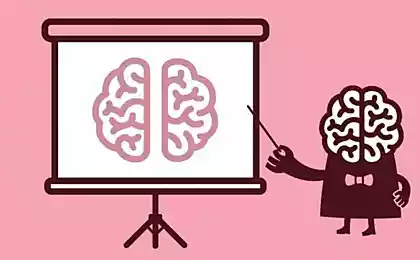202
How to rejuvenate consciousness and thinking for 10 years in a short time
Almost always our efforts are aimed at transforming the appearance, preserving the youthfulness of the skin and the beauty of the hair. But we forget that our internal organs, especially the brain, are getting older. Regardless of age, we recommend that you take into account the useful life-changing habits. Using simple techniques today, you can avoid many problems in the future.

Until recently, it was believed that the brain gradually ceases to develop and by the age of 25-30 becomes a stable system. However, new research has shown that this important organ has so-called neuroplasticity. That means ours. The brain is able to adapt, change and learn throughout life.. In addition, nerve cells are restored!

As it turned out, this very plasticity of the brain can be improved and trained in every possible way, and with the help of very simple actions. Renowned neuroscientist Brian Penny shares the habits that helped him change and start a new life after the black stripe.
Take care of the quality of sleep It is the easiest thing you can do today. Sleep greatly affects important functions of our brain.And the whole organism. For good health, a person should sleep for 7-8 hours a day. To avoid problems with falling asleep, you need to form healthy habits associated with sleep.

© Freepik
When you experience anxiety or other unpleasant emotions, try to look at yourself from the outside. It's like meditation: you have to. carefully observe the sensations in your body, the flow of thoughts. Don’t cling to these thoughts, let them float by as if they were clouds overhead.

© Freepik Such observations turn off the passive mode of the brain. It's when we jump randomly from one thought to another. It is in this mode that we most often wind ourselves up and immerse ourselves in the negative, often unreasonable. If you observe yourself, the rational part of the brain takes over.
Find the questions, not the answers, and everyone has a moment where you feel stuck. Instead of looking for answers, Try asking yourself questions.. Sometimes they are much better at understanding the situation. Here are examples of issues that help break the deadlock.

© Freepik
The best way to overcome your fears is not to hide from them. If you are afraid of a difficult conversation and have been postponing it for six months, just start. Fear, but do it anyway. Often, for fear of failure, people put off their entire lives for later. It is better to screw up, learn from your mistakes and succeed than to avoid any difficulties and stagnate. Don’t let your emotions rule your life.

© Freepik Use failures and difficulties as fuel If you are covered by a wave of difficulties, use this wave to get to the shore, not to slosh in the abyss. In difficult times focus on progressEven if it's barely visible. Ask yourself what is good in your life that you can grab. It's bound to be there.

© Freepik And if there is a situation that can not be influenced at all, try to accept it. Worrying and complaining about what you can’t change is not productive. Learn valuable lessons and experiences from failure Instead of feeling sorry for yourself. This way you will be guaranteed against repeating mistakes in the future.
If you keep telling yourself that nothing works and everything goes awry, then it will. Scientists have long proved that Words and thoughts affect our emotional state. and, by extension, action. People who constantly complain about how bad things are in their lives tune in to failure and even subconsciously provoke them.

Just pay attention to what words you use towards yourself, what image of yourself is fixed in your head. Change the inner dialogue and attitudes that inhibit your development and hinder your happiness.
We recommend that you try to develop these life-changing habits. These techniques are simple, but very effective.

Until recently, it was believed that the brain gradually ceases to develop and by the age of 25-30 becomes a stable system. However, new research has shown that this important organ has so-called neuroplasticity. That means ours. The brain is able to adapt, change and learn throughout life.. In addition, nerve cells are restored!

As it turned out, this very plasticity of the brain can be improved and trained in every possible way, and with the help of very simple actions. Renowned neuroscientist Brian Penny shares the habits that helped him change and start a new life after the black stripe.
Take care of the quality of sleep It is the easiest thing you can do today. Sleep greatly affects important functions of our brain.And the whole organism. For good health, a person should sleep for 7-8 hours a day. To avoid problems with falling asleep, you need to form healthy habits associated with sleep.

© Freepik
- Don't go to bed if you don't want to sleep. This will not lead to anything good, you will only be nervous about not being able to sleep and replay negative thoughts in your head. Read a book or do yoga until you feel sleepy.
- Lie down and wake up at the same time. When the time to go to bed and wake up is constantly changing, our body experiences stress, as during the change of time zones.
- Don’t sleep 5 more minutes in the morning. After waking up, the brain needs some time to start working fully. If you continue to lie in bed at this point, there is a high probability that you will walk all day with a heavy head and low productivity.
When you experience anxiety or other unpleasant emotions, try to look at yourself from the outside. It's like meditation: you have to. carefully observe the sensations in your body, the flow of thoughts. Don’t cling to these thoughts, let them float by as if they were clouds overhead.

© Freepik Such observations turn off the passive mode of the brain. It's when we jump randomly from one thought to another. It is in this mode that we most often wind ourselves up and immerse ourselves in the negative, often unreasonable. If you observe yourself, the rational part of the brain takes over.
Find the questions, not the answers, and everyone has a moment where you feel stuck. Instead of looking for answers, Try asking yourself questions.. Sometimes they are much better at understanding the situation. Here are examples of issues that help break the deadlock.

© Freepik
- What can I control in this situation? If you pay attention to what is under your control, you will feel the strength to solve the problem.
- What am I avoiding? Very often we understand what needs to be done, but all the time we delay actions and are afraid.
- Isn't that contrary to my values? Don’t make decisions and do things that don’t fit into your value system.
- If I agree now, what will I have to give up? Make sure you don’t sacrifice things that matter more to you for anything.
- What’s the worst case scenario if I don’t agree? Very often, the worst thing that can happen is not a disaster at all.
The best way to overcome your fears is not to hide from them. If you are afraid of a difficult conversation and have been postponing it for six months, just start. Fear, but do it anyway. Often, for fear of failure, people put off their entire lives for later. It is better to screw up, learn from your mistakes and succeed than to avoid any difficulties and stagnate. Don’t let your emotions rule your life.

© Freepik Use failures and difficulties as fuel If you are covered by a wave of difficulties, use this wave to get to the shore, not to slosh in the abyss. In difficult times focus on progressEven if it's barely visible. Ask yourself what is good in your life that you can grab. It's bound to be there.

© Freepik And if there is a situation that can not be influenced at all, try to accept it. Worrying and complaining about what you can’t change is not productive. Learn valuable lessons and experiences from failure Instead of feeling sorry for yourself. This way you will be guaranteed against repeating mistakes in the future.
If you keep telling yourself that nothing works and everything goes awry, then it will. Scientists have long proved that Words and thoughts affect our emotional state. and, by extension, action. People who constantly complain about how bad things are in their lives tune in to failure and even subconsciously provoke them.

Just pay attention to what words you use towards yourself, what image of yourself is fixed in your head. Change the inner dialogue and attitudes that inhibit your development and hinder your happiness.
We recommend that you try to develop these life-changing habits. These techniques are simple, but very effective.
























